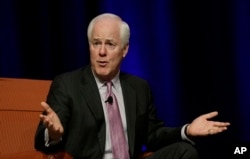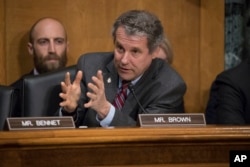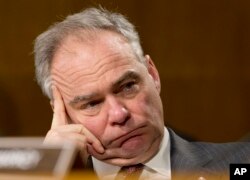The Republican-led U.S. Congress took one of its first steps toward fulfilling a promise to roll back Obama administration regulations.
In a 52-47 vote Friday, the Senate passed legislation to end a rule requiring oil and gas companies to disclose payments from the U.S. and foreign governments. Democratic opponents argued the rule furthered transparency and helped prevent corruption in foreign government's dealings with oil companies.
The rule was part of the 2010 Dodd-Frank legislation passed by the Obama administration following the 2008 financial crisis. Debate on the Senate floor Thursday night focused on the impact of the rule on the U.S. economy.
Issues handled under other laws
After the legislation was passed early Friday, Senate Majority Whip John Cornyn told VOA, “We're not saying there shouldn't be any regulation, but I believe the over-regulation and overreach by the Obama administration has strangled our economy and reduced economic growth and cut jobs.”
Cornyn said the issues addressed by the rule will handled under other laws.
“This bill is only about regulation and compliance costs and not about the underlying concern because it's already illegal, to my knowledge,” he said.
In a statement of support earlier in the week on the White House website, the Trump administration said, “The rule would impose unreasonable compliance costs on American energy companies that are not justified by quantifiable benefits. Moreover, American businesses could face a competitive disadvantage in cases where their foreign competitors are not subject to similar rules.”
'Kleptocrat Relief Act'
Democrats took to the Senate floor to criticize their Republican colleagues for using the Congressional Review Act to roll back rules that had gone through years of review and study, arguing the bill was an effort to appease corporate allies.
“The bill ought to be titled the Kleptocrat Relief Act. My Republican colleagues are trying to repeal a critical, bipartisan rule,” said Senator Sherrod Brown, a Democrat from Ohio.
“It's one of the best anti-corruption tools that President Trump now has to keep his promise to — in his words — drain the swamp' in Washington and around the world,” Brown continued.
OxFam concerned
Senator Tim Kaine, a Virginia Democrat who ran as Hillary Clinton's vice presidential nominee, tweeted late Thursday, “Now Trump Admin paves way for a reversal that helps Big Oil & allows corruption in poor resource-cursed countries.”
OxFam, a global organization working to end poverty, said the elimination of the rule encouraged secrecy that harms the poorest people in the world.
“It is clear today that many elected officials have no backbone when it comes to standing up to big oil. Doing the oil lobby's bidding, they are undermining U.S. national security, stripping critical investor protections, and promoting corruption all to protect secret oil payments to governments like Russia, China and other resource-rich countries,” Isabel Munilla, Oxfam America's senior policy adviser for extractive industries, wrote in a statement on their website Friday.
President Trump is expected to sign the legislation into law shortly.







